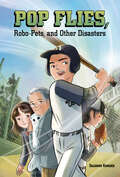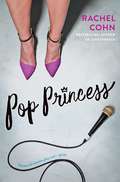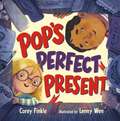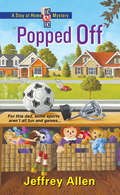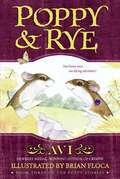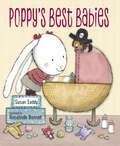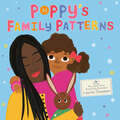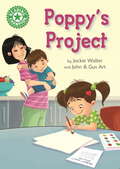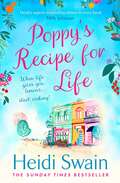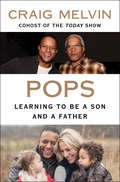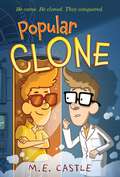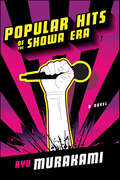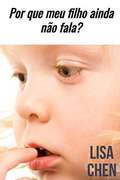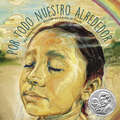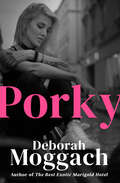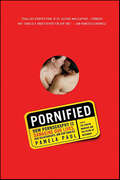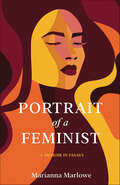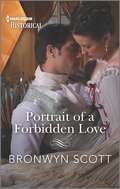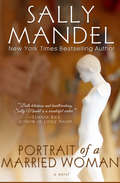- Table View
- List View
Pop Flies, Robo-Pets, and Other Disasters
by Suzanne KamataThirteen-year-old Satoshi Matsumoto spent the last three years living in Atlanta where he was the star of his middle-school baseball team—a slugger with pro potential, according to his coach. Now that his father's work in the US has come to an end, he's moved back to his hometown in rural Japan. Living abroad has changed him, and now his old friends in Japan are suspicious of his new foreign ways. Even worse, his childhood foe Shintaro, whose dad has ties to gangsters, is in his homeroom. After he joins his new school's baseball team, Satoshi has a chance to be a hero until he makes a major-league error. "A heart-warming story about a baseball player who learns that teamwork is much more important than being the star of the team. I loved the family dynamics and depiction of life, and especially baseball, in Japan."—Shauna Holyoak, author of Kazu Jones and the Denver Dognappers (Hyperion, 2019) "A story set in Japan rich in details only Kamata, an insider, could share. With ease and respect, she weaves the pressures, agonies, and loyalties of Satoshi's life at home, at school and on a junior high baseball team with the practices and traditions of the game played in Japan. I am a big fan of this middle-grade homerun!"—Annie Donwerth Chikamatsu, award-winning author of Somewhere Among (Atheneum/Caitlyn Dlouhy Books, 2017) "Pop Flies really pops! A lively, fun, easy read that draws you in and keeps you guessing."—Dori Jones Yang, award-winning author of The Forbidden Temptation of Baseball (SparkPress, 2017)
Pop Princess
by Rachel Cohn"This is not a school musical, this is millions of people seeing you, recognizing you, criticizing you. This is it. Public person -- the good, the bad, and the ugly. Are you ready?" When fifteen-year-old Wonder Blake is plucked from her job at the Dairy Queen and given the chance to become a teen idol, it seems like a dream come true -- even if it wasn't her dream, but her older sister Lucky's. Lucky was on her way to becoming a pop star when she died, and Wonder and her family are still trying to recover from their loss. Offered a recording contract, Wonder jumps at the chance to escape from a dead-end town, her fractured family, and worst of all, high school. Suddenly she has it all: a hot new look, a chart-busting hit single, a tour opening for superstar Kayla. But stardom isn't all glamour -- it's also lots of work. And maybe what Wonder really wants is as simple as a guy who likes her for herself. With spark and humor Rachel Cohn captures the struggles and glories of an ordinary teenage girl's climb to celebrity. As Wonder rises through the pop-princess star-making machine, she also learns the price -- and that maybe being an ordinary teenage girl isn't so bad after all.
Pop's Perfect Present
by Corey FinkleA heartwarming and playful celebration of a little girl's love for her father as she tries to give him the best day ever.The best dad ever deserves the best day ever. When a young girl tries to find the perfect present for her pop, her best intentions go awry. The fishing trip is a flop, baseball is a bust, and making chili is a mistake. Nothing works out the way she wants it to. But it turns out, the best gift of all could be a day spent together.With a classic knack for rhythm and rhyme and a great sense of humor, Pop’s Perfect Present is the answer to any gift-giving dilemma for dads.
Popped Off (Stay at Home Dad Mysteries #2)
by Jeffrey AllenFor stay-at-home dad Deuce Winters, the cutthroat world of suburban kiddie sports leagues is unavoidable. In his small town of Rose Petal, Texas, Moises Huber is known as the King of Soccer. But it seems the king may have fallen from his throne when he disappears--along with $73,000 of the Rose Petal Youth Soccer Association's registration fees. Deuce calls foul and begins a bizarre search that leads him to a high-stakes gambling ring, a band of shrewd smugglers, and one heckuva Texas-sized mega church. As he closes in on the truth, Deuce has only one goal in mind: stay on the ball and out of the penalty zone before his opponent can make a killer pass--and still have dinner ready on time. . ."Laugh-out-loud funny. A terrific read!" --Laura Levine on Stay at Home Dead
Poppy and Rye
by AviHeartbroken over the death of her fiance, Ragweed, Poppy, a deer mouse, journeys west through the vast Dimwood Forest to bring the sad news to Ragweed's family. But Poppy and her prickly porcupine pal, Ereth, arrive only to discover that beavers have flooded the serene valley where Ragweed lived. Together Poppy and Ragweed's brother Rye brave kidnapping, imprisonment, and a daring rescue to fight the beavers. At the same time, Rye -- who has lived in Ragweed's shadow -- fights to prove himself worthy of Poppy's love.
Poppy's Best Babies
by Susan EaddyPoppy, the little rabbit with a big personality, has a BIG problem--new baby twins!Poppy is thrilled when her grandmother comes to help with the new babies. But when the twins keep GeeGee too busy to play, Poppy's jealousy spirals out of control. After some thinking time, Poppy finds a way to use her talent and creativity to welcome both her grandmother and her little sisters. An honest and heartwarming look at sibling rivalry, and readers will identify with Poppy as she struggles with sibling rivalry--and cheer when her big heart helps her overcome her negative feelings.
Poppy's Family Patterns
by Lauren SemmerDiscover the magic of patterns and the power of fixing things in this heartwarming children's book. Written and illustrated by New York Times bestselling illustrator Lauren Semmer, this book shows that each pattern is unique, but together they can be magical—just like families!Poppy is sad when her toy bunny&’s dress rips. Now she&’ll have to throw it away! But her mom has other ideas. She shows Poppy the trunk in her sewing room, and it&’s full of fabric scraps! There are so many patterns—dots and stripes, checkers and chevron. Each scrap has its own story. Fabric from Granddad&’s tie, Nana&’s dress, and her auntie&’s scarf come together with Mom&’s sewing machine to make something special—just like their family! New York Times bestselling illustrator Lauren Semmer weaves an introduction to patterns in this heartwarming story of family history and traditions.
Poppy's Project: Independent Reading Green 5 (Reading Champion #113)
by Jackie WalterIn this story, Poppy has a project to do for school. She has some great ideas, but everything keeps going wrong. Luckily, Mum and Dad can help as well.Reading Champion offers independent reading books for children to practise and reinforce their developing reading skills.Fantastic, original stories are accompanied by engaging artwork and a reading activity. Each book has been carefully graded so that it can be matched to a child's reading ability, encouraging reading for pleasure.Independent Reading Green stories are perfect for children aged 4+ who are reading at book band 5 (Green) in classroom reading lessons.
Poppy's Recipe for Life: Treat yourself to the gloriously uplifting new book from the Sunday Times bestselling author!
by Heidi Swain*** THE SUNDAY TIMES BESTSELLER *** Treat yourself to a glorious novel full of food, sunshine, friendship and love! Things haven&’t always been straightforward in Poppy&’s life but her dreams are finally within her reach. She's moving into a cottage in beautiful Nightingale Square, close to the local community garden, where she can indulge her passion for making preserves and pickles. She may not have the best relationship with her family but she is surrounded by loving friends, and feels sure that even her grumpy new neighbour, Jacob, has more to him than his steely exterior belies. But the unexpected arrival of Poppy's troubled younger brother soon threatens her new-found happiness and as the garden team works together to win community space of the year, Poppy must decide where her priorities lie and what she is prepared to fight for …Readers everywhere are falling in love with Heidi Swain&’s writing: &‘A lovely, sweet, summery read&’ Milly Johnson &‘Wise, warm and wonderful&’ heat 'A ray of reading sunshine!&’ Laura Kemp, author of A Year of Surprising Acts of Kindness &‘Sparkling and romantic&’ My Weekly
Pops: Learning to Be a Son and a Father
by Craig MelvinA “deeply personal, heartwarming” exploration of fatherhood, addiction, and resiliency from the award–winning news anchor of NBC’s Today show (Shondaland).Growing up in Columbia, South Carolina, Craig Melvin had a fraught relationship with his father. A hard-drinking man who worked the graveyard shift at a postal facility, Lawrence Melvin was a distant parent. Craig found ways of connecting with his father through sports and tinkering with his beloved 1973 Pontiac LeMans. But as Lawrence’s drinking spiraled out of control, their bond was stretched to the breaking point. Fortunately, Craig had a loving, fiercely protective mother who held the family together. He also had a series of surrogate father figures in his life—uncles, teachers, workplace mentors—who by their examples helped him figure out the kind of person and father he wanted to be. Pops is the story of all these men, and of the inspiring fathers Craig has met reporting his “Dads Got This Series” on the Today show. For Craig, this book is an opportunity to better understand his father; to interrogate his family’s legacy of addiction and despair as well as transformation and redemption; and to explore the challenges facing all dads—including Craig himself, a father of two young children.
Popular Clone (The Clone Chronicles #1)
by M. E. CastleMeet Fisher Bas: 12 years-old, growth-stunted, a geeky science genius, and son of the Nobel Prize-winning creators of the Bas-Hermaphrodite-Sea-Slug-Hypothesis. No surprise: Fisher isn't exactly the most popular kid in his middle-school, tormented daily by the beefy, overgrown goons he calls The Vikings. But he senses relief when he comes upon the idea of cloning himself—creating a second Fisher to go to school each day while he stays at home playing video games and eating cheetos with ketchup. It's an ingenious plan that works brilliantly, until Fisher's clone turns out to be more popular than him—and soon after gets clone-napped by the evil scientist Dr. Xander. Can Fischer save his clone in time, or will his whole plan be exposed?
Popular Hits of the Showa Era: A Novel
by Ryu MurakamiFrom the author of Audition, a wickedly satirical and wildly funny tale of an intergenerational battle of the sexes. In his most irreverent novel yet, Ryu Murakami creates a rivalry of epic proportions between six aimless youths and six tough-as-nails women who battle for control of a Tokyo neighborhood. At the outset, the young men seem louche but harmless, their activities limited to drinking, snacking, peering at a naked neighbor through a window, and performing karaoke. The six "aunties" are fiercely independent career women. When one of the boys executes a lethal ambush of one of the women, chaos ensues. The women band together to find the killer and exact revenge. In turn, the boys buckle down, study physics, and plot to take out their nemeses in a single blast. Who knew that a deadly "gang war" could be such fun? Murakami builds the conflict into a hilarious, spot-on satire of modern culture and the tensions between the sexes and generations.
Por el amor de un hijo: Cinco historias sobre el amor maternal
by Jenny TwistUna chica atrapada en una casa de acogida para madres gestantes en la década de 1960 en Inglaterra, está deseperada y lucha por quedarse con su bebé. Una anciana escucha una canció en la radio y recuerda la traición cometida contra su hijo nonnato. Una niña desaparece en otro mundo y su familia mueve cielo y tierra para encontrarla. Una madre observa como su amado hijo parte en barco hacia una muerte casi segura y jura venganza. Un hombre joven regresa a España tras la guerra para salvar a su amada y a la hija por la que ella ha luchado. El amor de una madre puede adoptar muchas formas.
Por que meu filho ainda não fala?
by Lisa Chen Ana Paula NascimentoTodas as crianças se desenvolvem de maneira diferente e no seu próprio ritmo. Mas e se a criança tiver dois ou três anos e ainda não falar? E se todo mundo disser para não se preocupar que a criança falaria quando estivesse pronta? Lisa Chen passou por esse exato problema com sua filha. Ao redor, todos lhe davam uma opinião diferente mas ela seguiu o conselho de um profissional e conseguiu a ajuda que precisava. O desejo de Lisa agora é permitir que pais e famílias que passam pelo mesmo problema que sua filha, encontrem ajuda cedo para assim, ajudar mais crianças. No entanto, nem toda criança terá os mesmos sintomas ou resultados que a filha de Lisa teve. Lisa escreveu este livro apenas para fins informativos. Por favor, obtenha assistência médica e profissional para opiniões sobre a saúde e o bem-estar dos seus entes queridos.
Por todo nuestro alrededor
by Xelena GonzálezAmerican Indian Youth Literature Award - American Indian Library Association Pura Belpré Illustrator Award Honor - American Library Association (ALA)Este hermoso libro ilustrado, ganador del Pura Belpré Illustrator Honor y del American Indian Youth Literature Award Picture Book Honor, celebra los círculos que nos rodean, en el cielo, la tierra, nuestros vecindarios, nosotros mismos ... si nos atrevemos a buscarlos.Abuelo y nieta meditan sobre jardines y semillas, sobre círculos visibles e invisibles, mientras participan y crean tradiciones familiares en esta hermosa exploración de los ciclos de la vida y naturaleza. La versión en inglés ganó el premio Pura Belpre Honor por Illustración en el 2018. Busque el libro complementario, Donde las maravillas crecen. Grandpa and his granddaughter meditate on gardens and seeds, and on circles seen and unseen, as they share and create family traditions in this stunning exploration of the cycles of life and nature. All Around Us received a Pura Belpre Honor Award for Illustration in 2018. Look for the companion book, Where Wonder Grows.
Porch Lights: A Novel
by Dorothea Benton FrankNew York Times bestselling author Dorothea Benton Frank is back home in the Carolina lowcountry, spinning a tale that brims with the warmth, charm, heart, and humor that has become her trademark. Porch Lights is a stirring, emotionally rich multigenerational story--a poignant tale of life, love, and transformation--as a nurse, returning to Sullivans Island from the Afghanistan War, finds her life has been irrevocably altered by tragedy...and now must rediscover love and purpose with the help of her son and aging mother.An evocative visit to enchanting Sullivans Island with its unique pluff mud beaches, palmetto trees, and colorful local lore--a novel filled with unforgettable characters, and enlivened by tales of the notorious Blackbeard and his bloodthirsty pirate crew and eerie Edgar Allan Poe stories--Porch Lights stands tall among the very best works of not only Dottie Frank, but Anne Rivers Siddons, Rebecca Wells, Pat Conroy, and other masters of the modern Southern novel as well.
Porky
by Deborah MoggachThe bestselling author of The Best Exotic Marigold Hotel &“illuminates with great compassion how love can so easily go off the rails&” (Daily Mail). In the shadow of Heathrow airport, a girl grows up in a family of four with her unaffectionate, absent mother, her precocious younger brother, and her father. Once a traveling fairground worker, her father&’s been forced to settle down. Now he sits at home, dreaming up schemes to make money, drinking with his friends, raising pigs . . . It&’s those pigs that give Heather her nickname. The mean girls at school call her &“Porky,&” as much as for her animals as for her weight and pink complexion. They don&’t live in a decrepit bungalow like she does, surrounded by airport traffic and muck. And they don&’t have a father like she does, one who steals her innocence and makes her grow up too fast. This is Heather&’s story. It&’s easier for her to tell a stranger reading a book than her best friend, a counselor, the man who now loves her. Maybe you will understand her attempts to work, to live, to survive, to fly away as far as possible—as if her wings weren&’t already clipped . . . &“Deborah Moggach conveys with chilling skill the process by which a fundamentally bright, decent child becomes infested by corruption.&” —The Spectator &“At once eerily exuberant and bleak, this is a compassionate, tough book.&” —The Observer &“[An] extraordinarily skilful account of a childhood blasted by what is now acknowledged to be a more widespread offence than was previously recognised: incest.&” —London Review of Books &“Sustain[s] a first-person register so level in its tone of quiet desperation, so careful to avoid blatant shock, as to hold back the tidal wave of revulsion and pity which threatens, but never quite engulfs the reader.&” —The Times(London)
Pornified: How Pornography Is Damaging Our Lives, Our Relationships, and Our Families
by Pamela Paul"Strips porn of its culture-war claptrap . . . Pornified may stand as a Kinsey Report for our time."—San Francisco ChroniclePorn in America is everywhere—not just in cybersex and Playboy but in popular video games, advice columns, and reality television shows, and on the bestseller lists. Even more striking, as porn has become affordable, accessible, and anonymous, it has become increasingly acceptable—and a big part of the personal lives of many men and women. In this controversial and critically acclaimed book, Pamela Paul argues that as porn becomes more pervasive, it is destroying our marriages and families as well as distorting our children's ideas of sex and sexuality. Based on more than one hundred interviews and a nationally representative poll, Pornified exposes how porn has infiltrated our lives, from the wife agonizing over the late-night hours her husband spends on porn Web sites to the parents stunned to learn their twelve-year-old son has seen a hardcore porn film. Pornified is an insightful, shocking, and important investigation into the costs and consequences of pornography for our families and our culture.
Porter's Fortune
by Wyborn SennaSam and George Porter share DNA, but the similarities end there. As a world-class chef, successful restaurateur, and respected interior designer, Sam Porter is a modern day Renaissance man. His sophistication, extreme confidence, and egotistical nature are only a few of the qualities that differentiate him from his sibling. Unlike Sam, younger brother George suffers from bulimia, confusion over his sexual identity, and an extreme lack of confidence. But it's George who lands himself a spot in the limelight when successful actress Desirae Strand whisks him off to LA to star in her new crime show. For the first time in his life, George is the successful sibling. Unable to handle the newfound stardom of his incapable younger brother, Sam begins to unravel. He becomes hell-bent on bringing George back under his control--by any lengths necessary.
Porthminster Hall (The Cornish Sagas)
by Janet TannerA young woman attempts to reclaim her heritage and is drawn into mystery, danger and romance in this captivating gothic saga. Can Ella learn the truth about the fate of her mother and brother? One dark and stormy night, a terrified young mother seeks refuge at the home of her former nanny. Louise Polmar begs her former nanny to care for her baby then she flees. Louise never returns and until she is eighteen her child, Ella grows up unaware that she is one of the Polmars of Porthminster Hall. Ella tries to uncover the truth about the fate of her mother, but there are dark secrets at Porthminster Hall and as Ella delves into the mysteries of the past, she finds herself in mortal danger. The same mortal danger her mother fled from more than twenty years ago . . . An excellent choice for fans of Linda Finlay and Gloria Cook. Praise for Porthminster Hall&“A classic historical romance embellished with a dash of mystery and a soupcon of suspense, Tanner's latest will delight genre fans.&” —Booklist
Portland Family Adventures: City Escapades, Day Trips, Weekend Getaways, and Itineraries for Fun-Loving Families
by Jen StevensonDiscover Portland’s best family-friendly outings, activities, attractions, and day trips in this complete, portable guide to family fun.The Family Adventures guides are must-haves for local parents and visitors, as well as babysitters and other family members who want to explore Portland, Seattle, and the surrounding areas with kids. These go-to guides offer comprehensive ideas and listings appropriate for a wide array of ages, from babies and toddlers to young teens. Activities range from exploring children’s museums and other hands-on creative destinations to hiking, swimming, and ziplining, as well as visiting libraries, zoos, playgrounds, and much more, including where to find the best ice cream! Bursting with relevant, reliable information and tips, as well as itineraries for one day or more, these guides will take the place of hours of tedious online research. Instead you’ll find everything you need to know in one book that you can also pop into a bag or stroller and bring along with you. Whether you unexpectedly have a couple of free hours or want to plan a weekend away, grab a Family Adventures guide and make some amazing memories with your kids!From the Trade Paperback edition.
Portrait Of Chloe: a heartening and uplifting story of a girl seeking her fortune from multi-million copy seller Elvi Rhodes
by Elvi RhodesLet multi-million copy seller Elvi Rhodes sweep you away with this moving and heart-warming saga set by the sea. Perfect for fans of Rosamunde Pilcher and Maeve Binchy.READERS ARE LOVING PORTRAIT OF CHLOE!"Thoroughly enjoyed reading this book with its descriptive story and characters involved and I would recommend the reading of this to anyone" - 5 STARS"What a good writer [Elvi Rhodes] is...!" - 5 STARS"Magic" - 5 STARS**************************************************************************************IS THE GRASS ALWAYS GREENER ON THE OTHER SIDE?She was born plain Dora, in a bleak northern town where her future seemed all too predictable. But from the moment she was born, she went after what she wanted, and got it.When, at the age of eighteen, she decides she wants freedom, a new life - and a new name, Chloe, she goes to Brighton to work as a help to a MP and his wife, and glimpses for the first time a life of luxury and wealth - a life which, she believes, could be hers.But her new circumstances bring with them difficulties: the passionate interest of her boss and the unexpected bond she discovers with the small children she cares for. Torn between the interest of an attractive older man and her feelings of affection and loyalty towards his wife and children, Chloe embarks upon a dangerous course.Then a near tragedy changes everything for her...
Portrait of a Feminist: A Memoir in Essays
by Marianna MarloweInfused with a passion for justice, this sublime, expansive memoir by a Peruvian American feminist will appeal to fans of Crying in H Mart and How to Raise a Feminist Son. Through braided memories that flash against the present day, Portrait of a Feminist depicts the evolution of Marianna Marlowe’s identity as a biracial and multicultural woman—from her childhood in California, Peru, and Ecuador to her adulthood as an academic, a wife, and a mother. How does the inner life of a feminist develop? How does a writer observe the world around her and kindle, from her earliest memories, a flame attuned to the unjust? With writing that is simultaneously wise and shimmering, nuanced and direct, Marlowe explores her own experiences with the hallmarks of patriarchy. Interweaving stories of life as the child of a Catholic Peruvian mother and an atheist American father in a family that lived many years abroad, she explores realities familiar to so many of us—unequal marriages, class structures, misogynist literature, and patriarchal religion. Portrait of a Feminist confronts the two most essential questions of feminism today: What does it look like to live a life in defense of feminism? And how should feminism be evolving today?
Portrait of a Forbidden Love: A Sexy Regency Romance (The Rebellious Sisterhood #1)
by Bronwyn ScottThe Earl’s heirAnd the rebel artistArtist Artemisia Stansfield has four months to prove herself to the Royal Academy of Arts. When she finds out that aristocratic art critic Darius Rutherford has been snooping in her studio, she’s furious! Sparks of anger turn into flames of desire, but one lapse in judgment could give Darius all the fuel he needs to ruin her, as a lady and as an artist! Unless she trusts him enough to take the risk…From Harlequin Historical: Your romantic escape to the past.The Rebellious SisterhoodFemale artists…taking their world by storm!Book 1: Portrait of a Forbidden Love
Portrait of a Married Woman: A Novel
by Sally MandelA dissatisfied wife is tempted by another man in this novel by the New York Times–bestselling author of Out of the Blue: &“A wonderful writer&” (Luanne Rice, author of The Secret Language of Sisters). After seventeen years of marriage, Maggie Hollander seems like she has it all. Her husband, Matthew, still loves her deeply, and two irrepressible children complete the picture-perfect family in their elegant New York apartment. But at thirty-eight, Maggie has questions about herself that grow deeper and more disturbing. Once a promising artist, she decides to return to art class in search of answers. It is there she meets a sculptor who rekindles her talent—and her passion. David Golden will expose Maggie to a tenderness that is as liberating as it is dangerous, and will carry her toward an unforeseen choice . . . &“A living, breathing portrait of a truly contemporary woman . . . A lovely read.&” —Barbara Taylor Bradford, New York Times–bestselling author of Voice of the Heart
